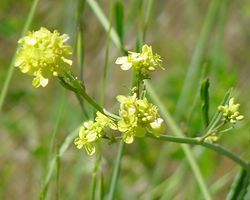| Home A B C D E F G H I J K L M N O P Q R S T U V W X Y Z |
|
Home |
The Benefits of Mustard
Mustard belongs to the impressive disease-fighting brassica family that includes important foods such as broccoli, Brussels sprouts and cabbage. In addition to being valued internationally as a spice, mustard has traditionally been used to relieve ailments such headaches, colds and flu and arthritis. Brassicas comprise one of the most important groups of cancer preventing foods, both in terms of their diversity and efficacy. Not only do they help to protect against a variety of malignancies, including cancer of the pancreas, prostate, breast, stomach and colon, but as little as two or three servings per month may be enough for their anti-cancer properties to take effect. 
The preventive properties of this plant family have been attributed principally to several compounds, the most important of which are indole-3-carbinol and the isothiocyanate group of chemicals - the most important of these being sulforaphane. These phytonutrients protect against cancer through a variety of mechanisms including the inhibition of cancer-promoting enzymes, induction of programmed cancer cell death and the protection of DNA and white blood cells against free radical damage. They also accelerate excretion of the powerful cancer causing compound, PhIP that occurs primarily in meat. So, if you can't cut down on your meat consumption, at least you now know that you can protect yourself against this toxin by adding lashings of mustard to your meat meals. Mustard also has strong antioxidant properties that it exhibits both directly - by mopping up free radicals - and indirectly by boosting levels of the body's own antioxidants. In addition to several antioxidant compounds that mop up free radicals themselves, mustard contains compounds that enhance the activity of both ingested and internally produced antioxidants. Sulforaphane for example, although not an antioxidant itself, is an effective inducer of internally produced antioxidant enzymes. These, in turn, enhance the activity of the crucial intracellular antioxidant, glutathione and also catalyze production of another of the body's powerful antioxidants, bilirubin. Very recent research has shown that sulforaphane also enhances the production of antioxidant enzymes in the respiratory tract. This helps the body to counter inflammation-inducing free radicals found in air pollutants such as exhaust fumes and tobacco smoke. Antioxidant enzymes in the respiratory tract protect against diseases such as hay fever, sinusitis, asthma and chronic obstructive pulmonary disease. Mustard baths have been used traditionally to treat colds, flu and muscle pains. What we now know is that, when eaten regularly, mustard and other brassicas can help prevent and modify respiratory problems and other serious diseases such as cancer. Keith Scott is a medical doctor who has a special interest in nutritional medicine. He has written several books on health related topics including Medicinal Seasonings, The Healing Power Of Spices and Natural Home Pharmacy. To download a free pdf copy of Medicinal Seasonings and read more about mustard, and other spices go to: http://www.medspice.com/ |
||
|
|
||
|
Glossary References Links Contact
|